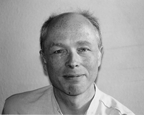Juror
Bernard Eisenschitz
For the Yamagata International Documentary Film Festival —Juror’s Statement
 “Trajet,” Robert Kramer reminded us, is “a beautiful French word that doesn’t exist in English.” I would tend to be interested in the “trajet” of images. A man, oddly dressed as a bird and about to jump from the Eiffel tower, is a sensation for the Gaumont newsreels, a meditation about mortality for Nicole Védrès (Paris 1900), but will tell Chris Marker another kind of truth about the battle of Okinawa (Level 5). A picture will travel.
“Trajet,” Robert Kramer reminded us, is “a beautiful French word that doesn’t exist in English.” I would tend to be interested in the “trajet” of images. A man, oddly dressed as a bird and about to jump from the Eiffel tower, is a sensation for the Gaumont newsreels, a meditation about mortality for Nicole Védrès (Paris 1900), but will tell Chris Marker another kind of truth about the battle of Okinawa (Level 5). A picture will travel.
In 1963, René Clément, a respectable fiction film director, was asked about the responsibility of the filmmaker—not a worn-out question at the time. Would he make a film about a burning subject like the concentration camps? Looking at the TV camera, Clément hypothesized that television, still in its early stages, tended to borrow from film language. But in the future, it would more and more dedicate itself to a wonderfully enlightening information function, and cinema to its storytelling calling—and each would go its own, separate way.
A strange message from another century. As we know, things happened differently. The overdose of meaningless information has become a great factor of stultification. On the other hand, most recent changes in film have come from cross-fertilization. The Lumière and Méliès inheritance are valid definitions only if they parasite each other.
Whether testimony, memory trace, essay, autobiography, fiction in disguise, diary or history, the problems facing the non-fiction filmmaker are the same Louis Lumière encountered (not consciously, but still) when he shot his workers coming out of the factory: a formal one—how do I get this on film? (By carefully framing the exits and speeding up the tempo, that is by “mise en scène,” no matter to what infinitesimal degree) and a moral one—do I have the right? (He did, since the camera’s subjects were Lumière’s employees, not his competitors’).
In an era of post-everything, in which every truth can be simulated, the two questions are still intertwined.
|
Bernard Eisenschitz
Film translator and historian. Has published books about Fritz Lang, Nicholas Ray (English and Japanese editions), German and Soviet cinema, and most recently an interview book with Robert Kramer: Points de départ, entretien avec Robert Kramer. A member of the editorial board of Cinémathèque through issue #18, he is chief editor of the follow-up magazine, Cinéma 02. |
|
• International Competition | Angelos’ Film | A2 | Buenaventura Durruti, Anarchist | Crazy | Days in Those Mountains | La Devinière | Gaea Girls | Grandma’s Hairpin | In Vanda’s Room | The Land of the Wandering Souls | Mysterious Object at Noon | Paragraph 175 | Private Chronicles. Monologue | 6 Easy Pieces | Southern Comfort • Jurors | Hartmut Bitomsky | Bernard Eisenschitz | Ann Hui | Kuroki Kazuo | Ivars Seleckis |
